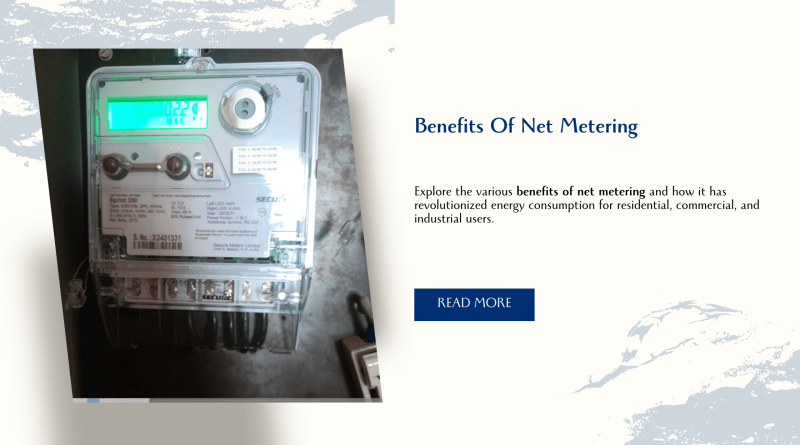Benefits Of Net Metering
As renewable energy gains momentum worldwide, net metering has emerged as one of the most effective tools for encouraging the adoption of solar power and other renewable energy sources. Net metering is a billing mechanism that allows consumers to generate their own electricity—usually through solar power—and feed any excess back into the grid. In return, consumers earn credits that reduce their electricity bills. This system promotes energy self-sufficiency, cost savings, and environmental sustainability.
In this blog, we will explore the various benefits of net metering and how it has revolutionized energy consumption for residential, commercial, and industrial users.
Table of Contents
The following are the benefits of Net Metering:
1. Reduced Electricity Bills
One of the primary advantages of net metering is the significant reduction in electricity bills. By generating your own electricity through solar panels or other renewable sources, you consume less from the grid. Any excess electricity you generate is sent back to the grid, earning you credits. These credits can be applied to your future bills, resulting in substantial savings.
For example, households with solar panels can often eliminate their electricity bills during sunny months, and in the long run, these savings can help recover the initial cost of the solar installation.
2. Promotes Renewable Energy Use
Net metering incentivizes the use of renewable energy, particularly solar and wind power. By offering financial rewards for the excess energy produced, net metering encourages more households and businesses to invest in clean energy technologies. This shift reduces reliance on traditional fossil fuels, which are harmful to the environment, and supports the global transition to a low-carbon economy.
3. Environmental Benefits
By promoting the use of renewable energy, net metering helps to reduce greenhouse gas emissions and mitigate the effects of climate change. Solar and wind power, unlike coal or natural gas, do not release carbon dioxide (CO₂) into the atmosphere. Thus, net metering systems contribute to clean energy production, helping nations meet their carbon reduction goals and combat global warming.
4. Energy Independence
Net metering gives consumers more control over their energy production and consumption. By generating electricity on-site, homes and businesses become less reliant on the grid, which can be prone to fluctuations and power outages. In areas where the electricity supply may be unstable, having a solar system with net metering can ensure energy reliability.
5. Easy Integration with the Grid
One of the main advantages of net metering is that it integrates seamlessly with the existing grid infrastructure. There is no need for complex systems or additional grid infrastructure to make net metering work. The energy produced by solar panels is simply fed into the grid using a bi-directional meter, making it an efficient and convenient solution for consumers and utility companies alike.
6. Supports Job Creation and Local Economy
The growth of renewable energy sectors, driven by net metering policies, has created numerous jobs in solar panel installation, maintenance, and manufacturing. This boom in green energy jobs supports local economies and provides a wide range of employment opportunities. As more people invest in renewable energy systems, the demand for skilled labor in these fields continues to grow.
7. Low Maintenance Costs
Solar power systems, one of the most popular sources of energy in net metering, have minimal maintenance requirements. After the initial investment and installation, the upkeep is generally limited to periodic cleaning and occasional inspections. Most solar systems have warranties of 20 to 25 years, making them a reliable and low-maintenance option for consumers looking for long-term energy solutions.
8. Short Payback Period
With net metering in place, the payback period for solar installations is often shorter than without it. The savings generated by lower electricity bills and the compensation for excess energy help recoup the cost of installing a renewable energy system. Depending on the location and system size, consumers may recover their investment in 5 to 10 years.
9. Encourages Efficient Energy Use
Net metering motivates consumers to become more conscious of their energy consumption. As they see the direct impact of their energy production and usage on their electricity bills, consumers are more likely to adopt energy-efficient practices such as using energy-efficient appliances and minimizing energy wastage.
10. Stabilizes the Grid
By encouraging decentralized energy production, net metering helps stabilize the grid, especially during peak demand periods. Distributed solar power generation reduces the strain on the grid and decreases the likelihood of blackouts. This is especially beneficial in regions with high electricity demand or areas prone to grid instability.
11. Future-Proofing Against Rising Energy Costs
Energy prices are expected to rise due to factors such as inflation, increased demand, and dwindling fossil fuel supplies. By investing in renewable energy systems and participating in net metering, consumers can future-proof themselves against the rising costs of electricity, ensuring stable and predictable energy expenses.
12. Government Incentives and Tax Benefits
Many governments around the world offer subsidies, tax credits, and other financial incentives for adopting renewable energy and participating in net metering programs. These incentives reduce the initial cost of installing solar panels or wind turbines, making it more affordable for consumers to invest in renewable energy solutions.
Key Benefits of Net Metering
| Benefit | Description |
|---|---|
| Reduced Electricity Bills | Consumers offset energy costs by exporting excess electricity to the grid. |
| Promotes Renewable Energy Use | Encourages the adoption of solar, wind, and other clean energy sources. |
| Environmental Impact | Reduces greenhouse gas emissions and contributes to a greener environment. |
| Energy Independence | Consumers gain control over their energy production, reducing reliance on the grid. |
| Grid Integration | Seamlessly integrates with the existing grid infrastructure without requiring major upgrades. |
| Job Creation | Supports the green energy sector, creating jobs in solar panel installation and maintenance. |
| Low Maintenance | Solar systems require minimal maintenance over their 20-25 year lifespan. |
| Short Payback Period | Net metering accelerates the payback period for solar installations, often within 5-10 years. |
| Efficient Energy Use | Encourages consumers to monitor and reduce their energy consumption. |
| Grid Stabilization | Distributed energy generation reduces grid strain during peak demand periods. |
| Protection Against Rising Costs | Future-proofs consumers from rising electricity prices. |
| Government Incentives | Financial subsidies and tax credits lower the cost of installing renewable energy systems. |
Conclusion
Net metering offers a wide range of benefits for both consumers and the environment. From reducing electricity bills to promoting renewable energy use, it is a vital policy for transitioning to a more sustainable energy future. By empowering consumers to generate their own electricity and earn credits for excess energy, net metering not only promotes environmental sustainability but also strengthens energy security and fosters economic growth.
Ready to Save on Electricity Bills with Solar Power?
With Net Metering, you can drastically reduce your electricity costs by generating your own solar power and sending any excess back to the grid. It’s time to harness the sun’s energy and make a positive impact on both your wallet and the environment!
At SolarClue, we make the transition to solar simple, efficient, and affordable. Whether you’re a homeowner, business, or institution, our team of solar experts will guide you through the process—from installation to maintenance—so you can start saving from day one.
🌞 Take the first step towards energy independence today!
🔋 Get your solar consultation now!
Contact SolarClue or call us at +91-888-4444-830 to explore the best solar solutions for your home or business.
Go Solar. Save More. Power Your Future with SolarClue!
FAQs
1. What is net metering?
Net metering is a system that allows consumers to generate their own electricity and send excess energy back to the grid, earning credits to offset future bills.
2. How does net metering reduce electricity bills?
By generating your own electricity, you consume less from the grid, and any surplus energy you produce is credited to your account, reducing your monthly electricity costs.
3. What types of energy sources are eligible for net metering?
Solar, wind, and other renewable energy sources are typically eligible for net metering programs.
4. What are the maintenance costs of a solar system?
Solar systems have minimal maintenance costs, usually requiring periodic cleaning and inspections. Most systems come with long warranties of 20 to 25 years.
5. Is net metering available everywhere?
Net metering policies vary by country and region. It’s best to check with your local electricity provider or regulatory body to see if net metering is available in your area.



